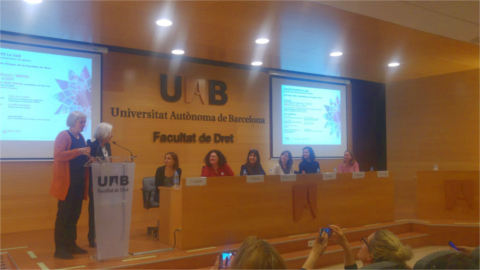RDL 6/2019: Essential contents and derived challenges

11/06/2019
Legislation is an area in constant change and adaptation, and the training of the future generations of jurists and lawyers also needs to be like this. In this context, the Faculty of Law, with the support of the Observatory, organised a conference for their students titled «Continguts essencials i reptes derivats del RDLL 6/2019». The activity was also a training session on educational innovation and was open to the whole the university community.
Among all the guidelines established by this new regulation there is one that has been highlighted due to its media impact and the years of vindication that have preceded it: we refer to maternity and paternity leave. Gala highlighted the important change that this new regulation represents for work and family life balancing and coresponsibility between women and men.
The most rellevant contribution of RDL 6/2019 is the equiparation in duration of paternity and maternity leave. The main change is that of paternity, which changes its name to guarantee the rights of LGBTI families, and that will gradually extend to 16 weeks. The possibility of enjoying the permissions of both parents at the same time or in alternation, in periods of weeks and until the child is 12 months old, the extension of the leave in the case of premature birth or hospitalisation of the child and the right to request the adaptation of the working day and working from home until the child is 12 years old.
These modifications are essential so workers can share the care of children during their first months of life and to adapt the duration and distribution of their working day to their family needs.
Other measures such as the obligation for companies with more than 50 workers to create equality plans and to register them in an official registry, with non-compliance being a serious offence, and to create a public registry of retributions by sex in order to guarantee the equality of remuneration without discrimination also stand out.
Gala pointed out the elements making this new legislation essential, such as the modification of the Organic Law 3/2007 and other labour legislations such as the Estatuto de los Trabajadores, the Estatuto Básico del Empleado Público, the Ley General de la Seguridad Social and the Estatuto del trabajo autónomo. All this makes that the introduction of this new decree implies the modification of the regulation framework regarding gender equality that we had up to now.
The conference concluded with debate in which experts from several areas of Labour Law took part. In this round table the importance of this kind of change in environments where the gender gap is so defined was highlighted.